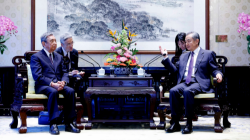China's Top Diplomat Holds High-Level Talks with Japanese Trade Association President to Strengthen Bilateral Economic Ties
China’s top diplomat Wang Yi meets with JAPIT president Yohei Kono in Beijing to promote international trade cooperation.

China's top diplomat, Wang Yi, hosted a meeting in Beijing on Wednesday with Yohei Kono, president of the Japanese Association for the Promotion of International Trade (JAPIT), as both sides reaffirmed the importance of strengthening diplomatic and economic ties between China and Japan.
During the meeting, Wang Yi, who serves as both a member of the Political Bureau of the Communist Party of China Central Committee and director of the Office of the Central Commission for Foreign Affairs, expressed deep appreciation for Kono’s longstanding efforts to foster friendly relations between the two nations. Wang underscored the critical role that people-to-people exchanges continue to play, especially amid a shifting global landscape, stating their significance “in the current international situation.”
Highlighting recent remarks by Japanese Prime Minister Shigeru Ishiba, Wang noted that China valued Ishiba’s comments regarding the need for Japan to reflect on its past and avoid repeating mistakes of aggression. Wang emphasized, “History cannot be tampered with, and only by learning from history can both sides truly open up the future.” His statement underlined the Chinese stance that historical awareness is essential for building a relationship based on mutual trust and lasting peace.
Responding to Wang’s remarks, Yohei Kono affirmed that “history should not be forgotten, nor should it be denied,” acknowledging that while the past remains unchangeable, the actions taken today are what will shape the future. Kono expressed JAPIT’s ongoing commitment to act as a bridge for commerce and dialogue between China and Japan, pledging to further promote friendly cooperation and constructive engagement moving forward.
The meeting is seen by observers as a significant gesture aimed at bolstering regional stability and partnership. As both countries navigate a complex international environment, their leaders’ renewed focus on historical reflection and forward-looking cooperation signals a willingness to address longstanding issues while advancing common interests.




